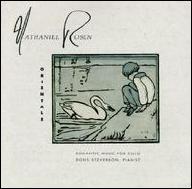He was taken for music lessons as a matter of course and at age six started studying cello with Eleanore Schoenfeld. Soon he was advanced enough to participate in the family¹s usual Friday-night chamber music. There was no pressure on the part of the family for Rosen to pursue a professional career in music. In fact, the family seems not to have considered the idea at all.
At the age of eleven he made his first public appearance, at a State Music Festival, and won several local competitions. At the age of thirteen he entered one in which the great cellist and teacher Gregor Piatigorsky was a jurist. Piatigorsky invited Rosen to become his pupil, becoming in the youngest of all his students. It was at this point that Rosen began seriously considering music as a career.
During his first year with Piatigorsky he worked on just two pieces: Piatti¹s Caprice for Cello no 8 in a minor and the Cello Sonata in a minor by Goltermann, a pedagogical concerto learned by many cellists. Piatigorsky suggested that Rosen enter the Moscow Tchaikovsky Competition. At the age of seventeen Rosen took one of the cash prizes. Piatigorsky appointed Rosen his assistant at the University of Southern California while the lad was still in his teens
Rosen stayed with Piatigorsky until he was twenty-one, and in the latter of those years was permitted to attend his master classes. He says that in these lessons Piatigorsky stressed making the music come alive, no matter how lofty or lowly the actual merit of the piece might be. He told the students that they should "taste the blood" when they played. Even after he ceased being a student of Piatigorsky, he retained his position as the master¹s assistant, serving until Piatigorsky¹s death in 1976.
At this point he decided to start developing his solo career. He settled in London for a year, with little work. His Wigmore Hall debut make little impression. So he returned to New York and prepared to try to make headway be entering competitions. Perhaps as an insurance policy he auditioned for and received the position of principal cellist with the Pittsburgh Symphony Orchestra.
Before he could begin that job, he won the prestigious Naumburg Competition. So he got the prestige, but little else besides the standard recital date, a few more bookings, and a management company. He decided to return to the Tchaikovsky Competition and was determined to win it. He succeeded, becoming in 1978 the first American to take the Gold Medal there since pianist Van Cliburn.
When he returned to Pittsburgh, the orchestra gave him a special victory concert as part of its usual participation in the Temple University Music Festival and Ambler. The date was sold out in six days, and Rosen played Tchaikovsky¹s Rococo Variations and the Dvorak Concerto to a triumphant ovation.
Critics now took notice, Daniel Webster of Musical America writing that it was obvious he had won "by the sheer force of his talent." There was a sudden demand for him as a soloist, which soon required that he leave the orchestra.
He has a clearly focused, pointed tone, rather than a lush, romantic one. With it, however, he achieves the goal of making the instrument sing, and his playing always seems to stress the cello¹s part in the texture of the music as a whole, be it orchestral or chamber playing. He began teaching at the Manhattan School of Music in 1982. ~ Joseph Stevenson, Rovi












